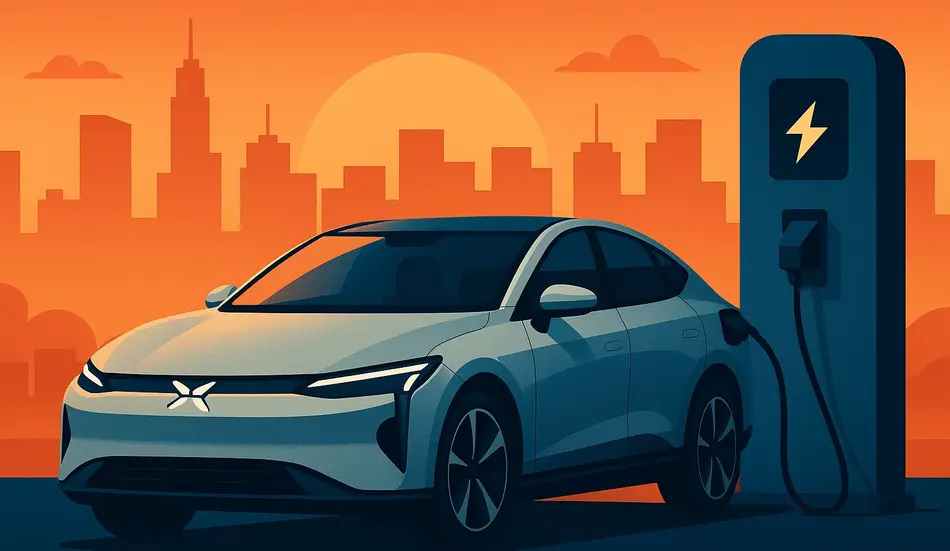Introduction: The Xiaomi EV Success Story That’s Shaking the Automotive World
In just four years after its founding, China’s Xiaomi became the third-largest phone maker globally, earning its CEO Lei Jun the nickname “Steve Jobs of China.” Now, the company is achieving unprecedented Xiaomi EV success in the electric vehicle market, outselling Tesla’s Model 3 in China and positioning itself as the ultimate Tesla killer.
This remarkable transformation represents one of the most significant disruptions in automotive history, with Xiaomi leveraging its tech expertise to create vehicles that combine high performance, affordability, and cutting-edge technology. The company’s SU7 sedan has already sold 200,000 units within a year of its release, demonstrating the power of Xiaomi’s innovative approach to the EV market.
The Rise of Xiaomi: From Phone Maker to Tesla Killer
How Xiaomi EV Success Strategy Evolved
The Xiaomi EV success didn’t happen overnight. This was a carefully orchestrated plan that began with the company’s smartphone strategy—learning from Apple’s playbook while targeting the mass market. When Apple abandoned its $10 billion Titan autonomous EV project, Xiaomi saw an opportunity to succeed where the tech giant had failed.
Key Milestones in Xiaomi’s EV Journey:
- 2010: Xiaomi founded as a smartphone company
- 2014: Becomes third-largest phone maker globally
- 2021: Apple abandons Titan EV project after $10 billion investment
- 2024: Xiaomi launches SU7 sedan, achieving immediate success
- 2025: SU7 outsells Tesla Model 3 in China, plans to double sales
The Apple Copycat Strategy That Worked
The Xiaomi EV success strategy mirrors its smartphone approach. Lei Jun earned his “Steve Jobs of China” nickname by emulating Apple’s founder, including his presentation style and product philosophy. However, Xiaomi’s genius lies in adapting Apple’s premium strategy for the mass market.
Xiaomi’s Adaptation Strategy:
- Benchmarking Against Leaders: Like phones against iPhone, cars against Porsche
- Mass Market Focus: Premium features at accessible prices
- Ecosystem Integration: Connected lifestyle across all devices
- Customer-Centric Approach: Technology companies focus on user experience
The SU7: The Car That’s Beating Tesla
Record-Breaking Sales Performance
The Xiaomi EV success with the SU7 has been nothing short of spectacular. Released on March 28th, 2024, the sedan achieved remarkable milestones that demonstrate its market dominance.
SU7 Sales Achievements:
- December 2024: Outsold Tesla Model 3 in China
- First Year: Sold 200,000 units
- Delivery Speed: First 100,000 units in 229 days, second 100,000 in just 119 days
- Market Position: Competing in sedan market despite China’s SUV preference
Performance That Rivals Premium Brands
The Xiaomi EV success isn’t just about sales numbers—it’s about performance that challenges established luxury brands. The SU7 has proven itself on the world’s most demanding racetrack, outperforming vehicles from Porsche, Tesla, and other premium manufacturers.
SU7 Performance Specifications:
- Base Model: 300 horsepower, $30,000 starting price
- Pro Version: Extended range with 300 horsepower
- Max AWD: Nearly 700 horsepower for performance enthusiasts
- Ultra Prototype: Approximately 1,500 horsepower
- Charging: 215 miles of range in 15 minutes (base model)
The Nürburgring Victory
The Xiaomi EV success reached its pinnacle when the SU7 outperformed the Porsche Taycan on the legendary Nürburgring racetrack. This achievement demonstrated that Xiaomi could compete with the world’s most prestigious automotive brands.
Nürburgring Performance:
- SU7 vs. Porsche Taycan: Xiaomi’s sedan outperformed the German luxury vehicle
- Performance Benchmarking: Following the same strategy used against Apple iPhone
- Affordability Factor: Premium performance at accessible price points
- Technology Integration: Advanced features typically found in luxury vehicles
Hiring? Post Jobs for Free with WhatJobs
Looking to fill positions in electric vehicle development, automotive engineering, or international manufacturing? Post your job openings for free on WhatJobs and connect with thousands of qualified professionals. We ensure quality applications while guarding against recruitment fraud.
- Free job postings
- Advanced candidate screening
- International recruitment tools
- Dedicated support team
The Technology Advantage: Why Xiaomi Succeeds Where Apple Failed
The Tech Company Approach to Automotive
The Xiaomi EV success stems from its unique position as a technology company entering the automotive space. Unlike traditional car manufacturers, Xiaomi brings a customer-centric, technology-first approach that resonates with modern consumers.
Tech Company Advantages:
- Customer Focus: Traditional automakers focus on product specs, Xiaomi focuses on user experience
- Accessory Ecosystem: Day-one availability of comprehensive accessory catalog
- Software Integration: Seamless connectivity with other Xiaomi devices
- Rapid Innovation: Faster development cycles than traditional automakers
The Connected Lifestyle Strategy
The Xiaomi EV success is built on the company’s “Human × Car × Home” strategy, creating an integrated ecosystem that connects users across all aspects of their lives.
Connected Ecosystem Components:
- Smartphones: Xiaomi’s core product line
- Home Appliances: Rice cookers, power strips, smart home devices
- Electric Vehicles: SU7 sedan and upcoming YU7 crossover
- Software Integration: Seamless connectivity across all devices
Why Apple Failed Where Xiaomi Succeeded
The Xiaomi EV success becomes even more remarkable when compared to Apple’s failed Titan project. While Apple invested $10 billion and ultimately abandoned its autonomous EV effort, Xiaomi has achieved significant market success.
Key Differences:
- Control Philosophy: Apple’s need for complete control vs. Xiaomi’s partnership approach
- Market Strategy: Apple’s premium-only approach vs. Xiaomi’s mass market focus
- Profit Margins: Apple’s 25% margins vs. automotive industry’s single-digit margins
- Supply Chain: Xiaomi’s access to China’s comprehensive EV supply chain
The Chinese Market Advantage
Supply Chain Dominance
The Xiaomi EV success is significantly enabled by China’s comprehensive electric vehicle supply chain, which has developed over the past 15 years to support the world’s largest EV market.
Supply Chain Advantages:
- Raw Materials Processing: Complete infrastructure for battery materials
- Battery Production: World-leading battery manufacturing capacity
- Motor Technology: Advanced electric motor development and production
- Electronics Integration: Sophisticated automotive electronics ecosystem
Market Size and Competition
The Xiaomi EV success occurs in the world’s most competitive EV market, with over 140 Chinese EV brands competing for market share. This intense competition has forced Xiaomi to innovate rapidly and deliver exceptional value.
Chinese EV Market Dynamics:
- 140+ EV Brands: Fierce competition driving innovation
- Tesla’s Challenges: Model Y remains dominant despite Xiaomi’s sedan success
- Price Wars: Aggressive pricing strategies from all manufacturers
- Government Support: Strong policy backing for electric vehicles
Challenges and Controversies
The Tragic Crash and Regulatory Response
The Xiaomi EV success faced a significant setback following a tragic crash that left three people dead in China. This incident led to government crackdowns on self-driving technology and public beta testing of software.
Impact of the Crash:
- Government Regulations: Banned public beta testing of autonomous driving systems
- Safety Concerns: Increased scrutiny of advanced driver assistance features
- Sales Impact: April 2025 sales dropped from March record
- CEO Absence: Lei Jun missed Shanghai Auto Show following the incident
Profitability Challenges
Despite the Xiaomi EV success in sales, the company faces significant profitability challenges in its EV segment. The smart EV business lost $850 million in 2024, though this represents a 7.1% improvement from the previous year.
Financial Performance:
- Gross Profit Margins: 18.5% for smart EV business
- Net Loss: $850 million in 2024
- Improvement: 7.1% narrower loss than previous year
- Overall Profitability: Company remains profitable through other segments
Brand Positioning Challenges
The Xiaomi EV success strategy of offering products in every conceivable category presents both opportunities and challenges. While it supports the connected lifestyle vision, it may dilute the brand’s focus and positioning.
Brand Challenges:
- Category Diversification: Products ranging from rice cookers to electric vehicles
- Premium Positioning: Neither premium brand nor category leader
- Market Competition: Middle-of-the-pack positioning in both smartphones and EVs
- Brand Clarity: Questions about core brand identity and focus
The YU7 Crossover: The Next Phase of Success
Expanding the Product Line
The Xiaomi EV success strategy continues with the launch of the YU7 crossover in May 2025. This expansion into the SUV segment targets China’s preferred vehicle type and could significantly boost sales.
YU7 Crossover Strategy:
- Market Alignment: Targeting China’s SUV and crossover preference
- Sales Projections: Plans to more than double 2025 sales over previous year
- Product Positioning: Building on SU7’s success and brand recognition
- Technology Integration: Leveraging lessons learned from sedan development
Potential for Tesla Model Y Competition
The Xiaomi EV success with the YU7 could position the company to challenge Tesla’s Model Y, which has been one of China’s best-selling vehicles in 2025.
Model Y Competition Factors:
- Market Segment: Crossover/SUV market where Model Y dominates
- Price Competition: Tesla’s aggressive financing and pricing strategies
- Technology Parity: Xiaomi’s advanced features and performance
- Brand Recognition: Growing awareness of Xiaomi’s automotive capabilities
Global Implications and Future Prospects
International Recognition
The Xiaomi EV success has attracted attention far beyond China’s borders. American automakers have acquired SU7 vehicles for benchmarking and competitive analysis.
International Interest:
- Rivian Benchmarking: Using SU7 to evaluate its own products
- Ford Analysis: Acquired SU7 for six-month evaluation in Chicago
- Competitive Intelligence: Traditional automakers studying Xiaomi’s approach
- Technology Assessment: Evaluating Xiaomi’s engineering and design capabilities
Export Potential
While Xiaomi currently sells only domestically, the Xiaomi EV success has generated significant international interest and could lead to future export opportunities.
Export Considerations:
- Regulatory Barriers: Chinese automakers face restrictions in US market
- Brand Recognition: Growing international awareness of Xiaomi brand
- Technology Transfer: Potential for partnerships with international manufacturers
- Market Expansion: Opportunities in other global markets
The Impact on Job Seekers and Career Opportunities
Emerging Career Paths in EV Industry
The Xiaomi EV success has created new career opportunities in electric vehicle development, manufacturing, and technology integration.
Career Opportunities:
- EV Engineering: Battery technology, motor design, vehicle integration
- Software Development: Autonomous driving, connectivity, user interface
- Supply Chain Management: Managing complex EV component networks
- Marketing and Sales: Promoting innovative EV products and features
Technology Integration Roles
The Xiaomi EV success demonstrates the growing importance of technology integration in automotive careers.
Technology Roles:
- IoT Integration: Connecting vehicles with smart home and mobile devices
- User Experience Design: Creating seamless interactions across platforms
- Data Analytics: Understanding user behavior and vehicle performance
- Cybersecurity: Protecting connected vehicle systems
Frequently Asked Questions (FAQ)
What is Xiaomi EV success and how did it achieve it?
Xiaomi EV success refers to the company’s remarkable achievement in the electric vehicle market, where its SU7 sedan outsold Tesla’s Model 3 in China within months of launch. Xiaomi achieved this through a combination of high performance at affordable prices, technology integration, and leveraging China’s comprehensive EV supply chain.
How does Xiaomi EV success compare to Tesla’s performance?
The Xiaomi EV success has been remarkable, with the SU7 outselling Tesla’s Model 3 in China by December 2024. Xiaomi sold 200,000 units in its first year, with delivery times improving from 229 days for the first 100,000 units to just 119 days for the second 100,000 units.
What makes Xiaomi a Tesla killer in the EV market?
Xiaomi EV success as a Tesla killer stems from its ability to offer premium performance at accessible prices, rapid innovation cycles typical of tech companies, and comprehensive ecosystem integration. The SU7 outperformed the Porsche Taycan on the Nürburgring while costing significantly less than premium competitors.
What challenges does Xiaomi EV success face going forward?
Despite Xiaomi EV success, the company faces several challenges including profitability issues (losing $850 million in 2024), regulatory restrictions following a tragic crash, brand positioning questions due to product diversification, and intense competition in China’s crowded EV market with over 140 brands.
Remember: The Xiaomi EV success represents a paradigm shift in the automotive industry, demonstrating how technology companies can disrupt traditional manufacturing sectors through innovation, customer focus, and ecosystem integration.




